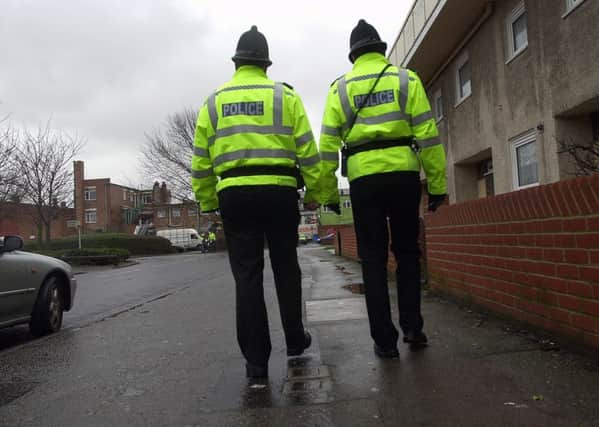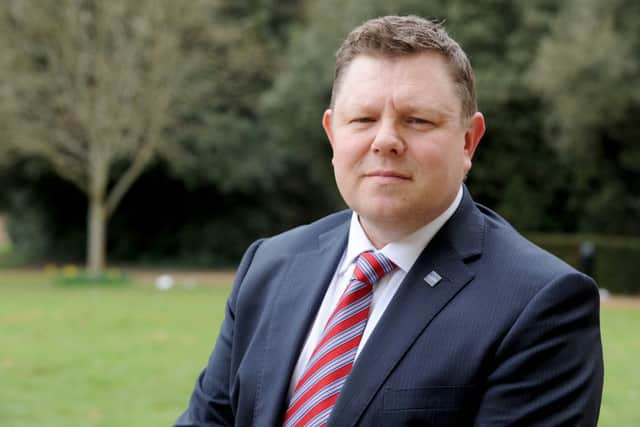Hampshire police forced to work 12-hour shifts to keep up with '˜surprise' demand


High-profile events, including the America’s Cup World Series in Portsmouth, have attracted ‘additional security’ after terror attacks in Europe have led to a knock-on for routine policing.
It comes as the force has had to reduce its number of officers from 3,756 in 2010 to 2,895 as of May this year due to cuts of around £80m by the Home Office since 2010.
Advertisement
Hide AdAdvertisement
Hide AdJust last week 999 response officers covering Fareham and Gosport were told to work a 12-hour shift.
Use of the shifts – about two hours longer than usual – was last enforced when police in Hampshire covered for colleagues who had been sent to deal with the 2011 London riots, when local officers’ rest days were also cancelled.
John Apter, Hampshire Police Federation chairman, said officers regularly go beyond their hours to protect the public during critical incidents but this should not be used to ‘sustain policing’ after cuts.
He told The News: ‘The summer months are always going to be testing and challenging with the America’s Cup, Isle of Wight Festival, Bestival and special events.
Advertisement
Hide AdAdvertisement
Hide Ad‘The demands on policing are greater than ever and this summer has highlighted – with the record low numbers of police officers we now have – how we have no resilience to cope with that demand. Police officers have had their leave restricted and some are now having to work extended 12-hour shifts to make sure safe levels of policing are maintained. Officers can’t refuse to work extended shifts, it is something they have to accept.


‘This impacts on their work/life balance and in some cases their health.’
He added there was an increase in sickness due to ‘unrelenting pressure’.
Volunteers from the Special Constabulary – unpaid officers and staff – have been drafted in to cover the demand.
Advertisement
Hide AdAdvertisement
Hide AdA cocktail of sickness leave, extra security for events following terror attacks, emergency leave and the sheer number of major public events has led to the use of 12-hour shifts.


Hampshire has the second highest number of events in the UK and this has increased by 55 since last year.
Chief Superintendent David Powell said terror in Europe, sickness and unexpected emergency leave had led to ‘exceptionally high demand’ with officers also being paid overtime.
He said: ‘Public safety and officer safety are paramount which is why we have adopted these arrangements and the EU working time directive is applied.
Advertisement
Hide AdAdvertisement
Hide Ad‘We are in the midst of a very busy summer, but we are coping with an increased demand on our resources.
‘Occasionally this means that we require people to stay on for overtime and to look at alternatives such as 12-hour working. We consider tactical options such as overtime and moving people across the force area, before introducing 12-hour working to meet our demand.
‘These options remove the need to cancel rest days, which may ultimately have a bigger impact on the welfare of officers and their families.’
He added that so far in the last two weeks 47 officers have been required to do 12-hour shifts. The force could not provide figures for any other overtime.
Advertisement
Hide AdAdvertisement
Hide AdHampshire’s police and crime commissioner, Michael Lane, who is currently consulting on setting a policing plan, said the use of 12-hour shifts was not related to cuts in policing.
He said: ‘Some people go too quickly to the reduction in numbers that have happened in the last few years.
‘I’ve inherited a good police force with excellent people.’
He said he trusted chief constable Olivia Pinkney to protect communities.
Demand on constabulary grows as illness increases
FULL-time officers work 40 hours in a week, earning overtime per shift if they work over their hours.
Advertisement
Hide AdAdvertisement
Hide AdOvertime payment rates have been heavily reduced since the implementation of the Winsor review in 2011.
Police on overtime claim time and a third - but work the first half an hour for free.
There are three kinds of variable shifts - days, lates and nights. Start times vary depending on need.
John Apter said: ‘Unless there’s an exceptional circumstances – I would say being in summer is not exceptional – they’ve got to have 11 hours between each shift.
Advertisement
Hide AdAdvertisement
Hide Ad‘They can do that with a 12-hour shift but any slippage does impact on the next shift.
‘It would appear the summer period has surprised the force.’
Between April 2015 and March this year, 7,864 days were missed by 277 officers and staff who took sick leave due to stress or stress-related illnesses. In April 2014 to March 2015, 190 officers and staff took stress-related sick leave over 6,480 days.
Chief Superintendent David Powell said: ‘We have reduced our number of police officers and staff by 1,500 since 2010.
Advertisement
Hide AdAdvertisement
Hide Ad‘As a consequence we utilise all of our resources when dealing with calls from the public.
‘The summer period is our busiest and demand on us is exacerbated by policing requirements for festivals and events across Hampshire and on the Isle of Wight.
‘The force area has the second-highest number of events across the UK and this number has risen by an additional 55 events since last year.’